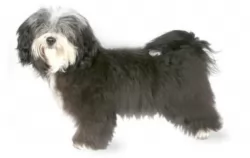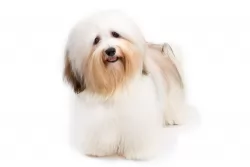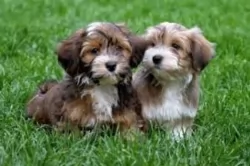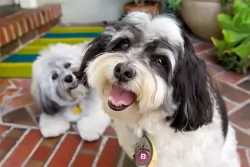 MyDogBreeds
MyDogBreeds Havanese is originated from Cuba but Australian Shepherd is originated from United States. Havanese may grow 31 cm / 12 inches shorter than Australian Shepherd. Havanese may weigh 26 kg / 57 pounds lesser than Australian Shepherd. Both Havanese and Australian Shepherd has almost same life span. Both Havanese and Australian Shepherd has same litter size. Havanese requires High maintenance. But Australian Shepherd requires Moderate maintenance
Havanese is originated from Cuba but Australian Shepherd is originated from United States. Havanese may grow 31 cm / 12 inches shorter than Australian Shepherd. Havanese may weigh 26 kg / 57 pounds lesser than Australian Shepherd. Both Havanese and Australian Shepherd has almost same life span. Both Havanese and Australian Shepherd has same litter size. Havanese requires High maintenance. But Australian Shepherd requires Moderate maintenance
 The only breed of dog that is native to Cuba is the Havanese. These little dogs are great companion animals. Sociable and happy, they are very popular in the United States with urbanites. These happy little pups are a Bichon type of dog which was developed from the “Little White Dog of Havana” or the Blanquito de la Habana which is now extinct.
The only breed of dog that is native to Cuba is the Havanese. These little dogs are great companion animals. Sociable and happy, they are very popular in the United States with urbanites. These happy little pups are a Bichon type of dog which was developed from the “Little White Dog of Havana” or the Blanquito de la Habana which is now extinct.
The Blanquito de la Habana was itself developed from another extinct breed the Bichon Tenerife. Then the Blanquito was bred with the other Bichons and poodles in developing the Havanese. It is believed that some of the first people to settle in Cuba were from Tenerife, an island close to Cuba. In the early part of the sixteenth century, little white dogs were brought to Cuba with these settlers. This dog of Tenerife is believed to be the ancestor of all Bichon breeds.
At that time trade with Cuba was highly restricted by the Spanish and so these dogs developed without any crossing from other breeds from outside the country. They grew to be able to stand hot temperatures and they grew a very unique coat – almost like silk. Their coat is soft and light, while insulating them from the tropical environment.
At this time Cuba was the place to be for Europeans aristocrats on vacation. Unlike the British colonies, Cuba had theatres, operas and palacious. When going back to Europe, many took this little white dog with them to France, Spain and England. The Dog of Havannah was a favorite on European soil as well. Many of these dogs taken to Europe were fawn or parti instead of white. Meanwhile back in Cuba, the bourgeoisie were replacing the aristocracy who themselves would soon be replaced by the Revolution.
During the days of the bourgeoisie, the Havanese became very popular household pets. The breed has been a family pet for the last 150 years. At the same time the breed was very trendy in Europe with Charles Dickens and Queen Victoria owning several. They were by now familiar participants in Europe’s dog shows. Finally, with the Revolution, the bourgeoisie left the country in droves with their little white dogs. A genetic pool was then formed in the US. Gene pool from 11 dogs. All the Havanese in the world are descended from those 11 dogs with the exception of the dogs isolated in Cuba and the US. Today the Havanese is one of the most popular and fastest growing breeds in the world.
 The Australian Shepherd, known fondly as ‘Aussies’, is actually an American breed, with the first official registry being in the 1950s. Basque Shepherds from Spain settled in Australia at the end of the 19th century, later moving to the United Stated with their dogs in tow. It is from these dogs that the breed originated. In the UK too, this breed of dog has many enthusiastic followers.
The Australian Shepherd, known fondly as ‘Aussies’, is actually an American breed, with the first official registry being in the 1950s. Basque Shepherds from Spain settled in Australia at the end of the 19th century, later moving to the United Stated with their dogs in tow. It is from these dogs that the breed originated. In the UK too, this breed of dog has many enthusiastic followers.
For many years, the Australian Shepherd has been recognized for their wonderful abilities as stock- or herding dogs, and today in Australia they continue to work as stock dogs and often take part in herding trials.
More recently, this working dog breed has been selectively bred to develop both Toy- and Miniature Aussies, and the American Stock Dog Registry actually recognizes 3 sizes today.The Australian Shepherd Club of America was also founded in 1957 to promote the breed.
 The Havanese is a sturdy little dog, a member of the toy group. They weigh no more than 16 pounds (7.3kg) and his body is longer than it is tall. The breed has a unique topline that is not level, but it is straight. His front legs are longer than his hind legs producing the lively gait everyone is used to seeing with a Havanese. With a full muzzle that tapers to the nose, the Havanese does not seem to be short. The skull’s length is the same as the muzzle’s. The head of the Havanese is round in the back and flat in the front.
The Havanese is a sturdy little dog, a member of the toy group. They weigh no more than 16 pounds (7.3kg) and his body is longer than it is tall. The breed has a unique topline that is not level, but it is straight. His front legs are longer than his hind legs producing the lively gait everyone is used to seeing with a Havanese. With a full muzzle that tapers to the nose, the Havanese does not seem to be short. The skull’s length is the same as the muzzle’s. The head of the Havanese is round in the back and flat in the front.
They have a deep chest, almond shaped eyes that are dark brown and their ears are about halfway down the nose. The long ears hang down the side od the face. They have a long plumed tail that is held high and upward. The standard for the breed and now the laws of the United Kingdom state that there can be no docking of the tail.
 Similar in appearance to the Border Collie, the Australian Shepherd is a medium sized dog and has a medium length coat which is straight to wavy with a weather resistant undercoat. The range of coat colours is amazing, and you’ll find blue, blue merle, black and red merle and all of these are with or without tan points. The Australian Shepherd is a drop-eared breed where prick ears are sometimes seen. Some Aussies are born with naturally bobbed tails while most have full, long tails.
Similar in appearance to the Border Collie, the Australian Shepherd is a medium sized dog and has a medium length coat which is straight to wavy with a weather resistant undercoat. The range of coat colours is amazing, and you’ll find blue, blue merle, black and red merle and all of these are with or without tan points. The Australian Shepherd is a drop-eared breed where prick ears are sometimes seen. Some Aussies are born with naturally bobbed tails while most have full, long tails.
There is variety in the eye colour too, and they are often heterochromatic, which means that they can have two different coloured eyes or the one eye can even be bi-coloured. Most times the eyes are brown, but they can be blue too.
 Havanese are highly intelligent and eager to please, and they are easily trained so long as you use only positive methods. This can be a sensitive breed, so care must be taken to not scold them harshly. Socialization from an early age is very important. Expose them calmly to a wide variety of new places and new people, always ensuring that the experiences are positive and not intimidating. Gentle, patient training will result in a wonderful companion dog. They are affectionate with people and get along with other nonaggressive pets.
Havanese are highly intelligent and eager to please, and they are easily trained so long as you use only positive methods. This can be a sensitive breed, so care must be taken to not scold them harshly. Socialization from an early age is very important. Expose them calmly to a wide variety of new places and new people, always ensuring that the experiences are positive and not intimidating. Gentle, patient training will result in a wonderful companion dog. They are affectionate with people and get along with other nonaggressive pets.
The Havanese is the consummate lap dog. Over time they have become the lovable family companion.
The breed is pretty adaptable being able to live as a companion animal in almost any setting. Just don’t expect your Havanese to go hiking or romp with you on 40 acres in the country.
They are intelligent, love to learn but can be a little stubborn. Train them early as they like their habits and its much harder to train an older Havanese.
 The Australian Shepherd is an intelligent dog, learning quickly. As a herding dog, he also has strong guarding instincts and will make a good watch dog. The dog has a balanced, even disposition, and even though he may show some reserve, he is certainly not a shy dog and isn’t aggressive.
The Australian Shepherd is an intelligent dog, learning quickly. As a herding dog, he also has strong guarding instincts and will make a good watch dog. The dog has a balanced, even disposition, and even though he may show some reserve, he is certainly not a shy dog and isn’t aggressive.
Your Aussie is a kind, loving, and devoted pet. He loves his human family and wants to spend lots of time with them. Don’t leave him without human companionship as he craves it and forms strong bonds with his family. Provide him with good care and with lots of fun and games and you’ve got an exceptional friend for life.
 A very healthy breed, the Havanese doesn’t have a lot of health issues, but they are not immune to the problems of small breed dogs. The issues they do have are:
A very healthy breed, the Havanese doesn’t have a lot of health issues, but they are not immune to the problems of small breed dogs. The issues they do have are:
 Aussies are a healthy breed and won’t cost you a fortune at the vet. However, like every other breed, they are also prone to certain health conditions such as cancer. When choosing a puppy, always look for a good, reputable breeder who can show you health clearances.
Aussies are a healthy breed and won’t cost you a fortune at the vet. However, like every other breed, they are also prone to certain health conditions such as cancer. When choosing a puppy, always look for a good, reputable breeder who can show you health clearances.
This is a dog ailment that can be inherited. It is where the femur doesn't fit properly into the pelvic socket of the hip joint. Also, as the dog ages, arthritis can develop.
Epilepsy an hereditary disorder where the seizures your dog gets can be treated and controlled.
Osteochondrosis Dissecans, commonly known as OCD is an orthopedic condition which comes about because of improper growth of cartilage in the joints. It can cause painful stiffening of the elbow joint for instance.
Progressive Retinal Atrophy or PRA is a degenerative eye disorder that can finally lead to blindness. Reputable Aussie dog breeders have their dogs' eyes certified regularly by a veterinary ophthalmologist.
Your newborn Australian Shepherd may well be strong and healthy, but he isn’t immune from life-threatening illnesses. Vaccinations are imperative for your Aussie puppy, with vets usually recommending that puppies be vaccinated for the first time from 6 to 8 weeks of age.
These vaccinations will include the 5-in-one and includes Parvovirus, Distemper, Hepatitis and Parainfluenza. Later on the puppy will get his first rabies shot and he will also require booster vaccinations.
 Feed 3 to 4 times per day a high quality dry puppy food for toy or small dogs. Feed ¼ to ½ cup each time.
Feed 3 to 4 times per day a high quality dry puppy food for toy or small dogs. Feed ¼ to ½ cup each time.
Remember these are small dogs and don’t overfeed. Feed a high quality dry food for small or toy dogs. Feed twice a day at about ½ cup each time.
The breed is generally very healthy.
This breed is not an overly active dog, but he does need some exercise. A nice walk once a day or a backyard to play in. They play inside as well as out. Don’t over exercise the Havanese. They do well in obedience and confirmation more so than agility or fly ball
 With his medium length coat, the Australian Shepherd sheds. In fact this particular breed sheds his hair the entire year round, but you’ll notice that with the arrival of Spring, he sheds more as this is when he is losing his Winter coat. You will most certainly need to brush his coat at least 2x a week to get rid of all those tufts of hair and to also prevent matting.
With his medium length coat, the Australian Shepherd sheds. In fact this particular breed sheds his hair the entire year round, but you’ll notice that with the arrival of Spring, he sheds more as this is when he is losing his Winter coat. You will most certainly need to brush his coat at least 2x a week to get rid of all those tufts of hair and to also prevent matting.
A puppy will need 4 bowls of vet-recommended food a day. How much your adult Australian Shepherd gets will depend on his age, size and activity levels.The quality of food you buy will make a difference as it will keep your Aussie in good shape. Remember to include raw or cooked meat into his diet once a week or so. For more on feeding your Aussie, speak to your vet. Always ensure a constant source of fresh, cool water.
The Australian Shepherd is a strong willed dog, used to playing the dominant role with the herding of livestock. He’ll need firm training and socialization if you want to make him an amicable family pet.
Like many herding dogs, Australian Shepherds are loyal to their family and don’t easily take to strangers. Aussies make awesome companions for families with kids who have been taught how to treat dogs and other pets with kindness and gentleness. Just like a dog needs socialization, a child needs to respect a sleeping, feeding dog and to leave him in peace.